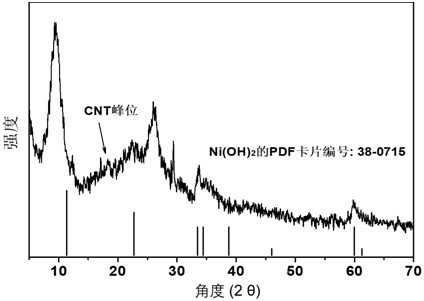A self-supporting material with one-dimensional and two-dimensional hybrid structure for positive electrode of lithium-air battery and preparation method thereof
A self-supporting, hybrid technology, applied in fuel cell half-cells and secondary battery half-cells, nanotechnology for materials and surface science, battery electrodes, etc., can solve the problem that the catalytic activity is difficult to be fully utilized , It is difficult to obtain high capacity performance and other problems, to achieve excellent electrocatalytic activity, solve the effect of catalyst agglomeration, and increase the surface area of catalytic activity
- Summary
- Abstract
- Description
- Claims
- Application Information
AI Technical Summary
Problems solved by technology
Method used
Image
Examples
Embodiment 1
[0033] In this embodiment, a self-supporting material with a one-dimensional and two-dimensional hybrid structure for the positive electrode of a lithium-air battery and a preparation method thereof include the following steps:
[0034] (1) Soak the bulk carbon nanotube sponge in absolute ethanol solution for 2 min for hydrophilic treatment.
[0035] (2) Prepare the dispersion. Add 3.2 mmol of nickel nitrate, 14 mmol of urea, 0.77 mmol of ammonium fluoride, and 1 mmol of sodium chromate into a 40 mL Teflon reactor in sequence, and stir for 2 h to obtain a uniformly dispersed dispersion.
[0036] (3) Take the carbon nanotube sponge after hydrophilic treatment (1 cm×1 cm×3 mm), immerse it in the dispersion prepared in step (2), place it on a shaker and vibrate for 4 h, so that the dispersion completely infiltrates the sponge.
[0037] (4) Transfer the sponge-impregnated dispersion in step (3) to a 100 mL reactor for solvothermal reaction. The reaction condition is to keep warm ...
Embodiment 2
[0042] In this embodiment, a self-supporting material with a one-dimensional and two-dimensional hybrid structure for the positive electrode of a lithium-air battery and a preparation method thereof include the following steps:
[0043] (1) Soak the bulk carbon nanotube sponge in absolute ethanol solution for 2 min for hydrophilic treatment.
[0044] (2) Prepare the dispersion. Add 3.2 mmol of nickel nitrate, 14 mmol of urea, 0.77 mmol of ammonium fluoride, and 1 mmol of sodium tungstate into a 40 mL Teflon reactor in sequence, and stir for 2 h to obtain a uniformly dispersed dispersion.
[0045] (3) Take the carbon nanotube sponge after hydrophilic treatment (1 cm × 1 cm × 3 mm), immerse it in the dispersion prepared in step (2), place it on a shaker and vibrate for 4 h to make the dispersion completely infiltrate the sponge.
[0046] (4) Transfer the sponge-impregnated dispersion in step (3) to a 100 mL reactor for solvothermal reaction. The reaction condition is to keep wa...
Embodiment 3
[0051] In this embodiment, a self-supporting material with a one-dimensional and two-dimensional hybrid structure for the positive electrode of a lithium-air battery and a preparation method thereof include the following steps:
[0052] (1) Soak the carbon nanotube sponge in absolute ethanol solution for 2 min for hydrophilic treatment.
[0053] (2) Prepare the dispersion. Add 2.4 mmol of nickel nitrate, 0.8 mmol of ferric nitrate, 14 mmol of urea, 0.77 mmol of ammonium fluoride, and 1 mmol of sodium chromate into a 40 mL Teflon reactor in sequence, and stir for 2 h to obtain a uniform Dispersed dispersion.
[0054] (3) Take the carbon nanotube sponge after hydrophilic treatment (1 cm × 1 cm × 3 mm), immerse it in the dispersion prepared in step (2), place it on a shaker and vibrate for 4 h to make the dispersion completely infiltrate the sponge.
[0055] (4) Transfer the first dispersion soaked in sponge in step (3) to a 100 mL reactor for solvothermal reaction. The reactio...
PUM
| Property | Measurement | Unit |
|---|---|---|
| size | aaaaa | aaaaa |
| current density | aaaaa | aaaaa |
Abstract
Description
Claims
Application Information
 Login to View More
Login to View More - R&D
- Intellectual Property
- Life Sciences
- Materials
- Tech Scout
- Unparalleled Data Quality
- Higher Quality Content
- 60% Fewer Hallucinations
Browse by: Latest US Patents, China's latest patents, Technical Efficacy Thesaurus, Application Domain, Technology Topic, Popular Technical Reports.
© 2025 PatSnap. All rights reserved.Legal|Privacy policy|Modern Slavery Act Transparency Statement|Sitemap|About US| Contact US: help@patsnap.com



